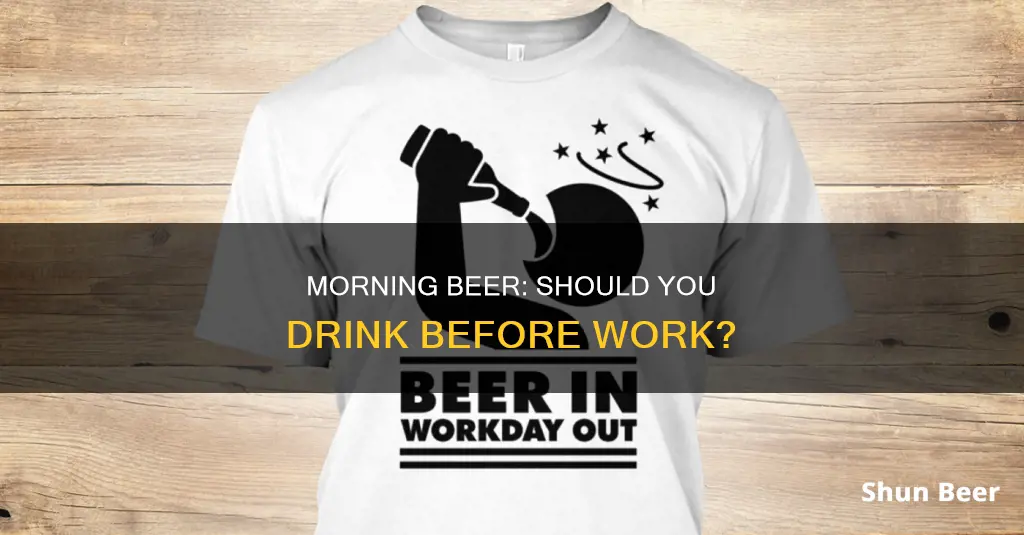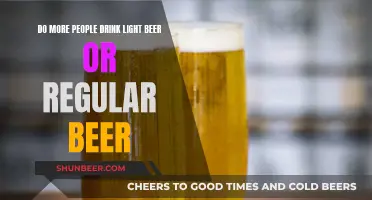
Drinking before work is generally not considered normal and can be a sign of alcohol abuse or dependence. People who drink before work may be trying to soothe withdrawal symptoms from heavy drinking the night before, or they may be using alcohol to cope with stress or anxiety. Drinking before work can negatively impact productivity and health, and increase the risk of accidents, especially when operating machinery or performing tasks requiring focus and control. While it may be tempting to think that a drink or two before work can boost confidence or creativity, it is important to be mindful of the potential risks and negative consequences associated with this behaviour.
| Characteristics | Values |
|---|---|
| Reason | To soothe withdrawal symptoms, cope with stress or anxiety, boost confidence or creativity, or socialise |
| Perception | Most people don't consider it normal; may be a sign of alcohol abuse or alcohol use disorder |
| Effects | Negative impact on productivity and health, increased risk of accidents and DUI, higher likelihood of drinking throughout the day |
| Disciplinary Action | Can be grounds for termination depending on company policy and local employment laws |
What You'll Learn

Morning drinking and alcohol abuse
The Risks of Morning Drinking:
Morning drinking, or consuming alcohol shortly after waking up, poses unique risks and can be indicative of underlying alcohol abuse or dependence. One of the primary dangers is an increased likelihood of accidents and injuries due to alcohol's impairing effects on judgment, focus, vision, hearing, and coordination. Morning drinking can also disrupt sleep patterns, leading to fatigue and difficulties returning to a healthy sleep schedule. Additionally, drinking on an empty stomach allows alcohol to enter the bloodstream more rapidly, increasing the risk of negative side effects and overdose. Morning drinkers may also be more likely to mix alcohol with caffeine, falsely believing that caffeine can "sober them up." However, caffeine only masks the depressant effects of alcohol and can lead to excessive drinking.
Impact on Productivity:
Alcohol consumption, especially in the morning, can significantly impact an individual's productivity throughout the day. It impairs concentration, problem-solving skills, and memory, affecting job performance and the ability to complete daily tasks. Regular morning drinking can also lead to long-term cognitive issues, such as memory loss, learning difficulties, and even permanent brain damage, further hindering productivity and overall functioning.
Alcohol Use Disorder:
Morning drinking can be a sign of alcohol use disorder (AUD) or the development of physical dependence on alcohol. Regular morning drinkers may find themselves unable to function properly without alcohol and may experience withdrawal symptoms if they attempt to stop drinking. Additionally, they may develop a tolerance to alcohol, requiring larger or more frequent amounts to achieve the desired effects. AUD is a disease that requires professional treatment and can be identified through screening tools such as the CAGE questionnaire. Seeking help is crucial to address the underlying causes and develop healthy coping mechanisms.
Workplace Policies:
Many companies have strict policies regarding alcohol consumption before work, often requiring employees to be alcohol-free for a certain number of hours before their shift starts. These policies aim to ensure employee safety, particularly for those in roles requiring clear judgment and coordination, such as emergency services or driving. Some companies implement breathalyzer tests, and failure to comply or registering any amount of alcohol can result in disciplinary action or termination.
The Road to Recovery:
Recognizing the warning signs of alcohol abuse and seeking treatment are crucial steps toward recovery. Treatment providers offer a range of programs, including medical detox, mental health counseling, and support groups, to help individuals overcome alcohol abuse and regain control of their lives. It is important to remember that recovery is a journey, and specialized treatment facilities can provide the necessary support and tools to achieve long-term sobriety.
Beer and Bowel Movements: The Laxative Effect
You may want to see also

Company policy on drinking
Drinking before work can be a tricky topic, and it's important to understand a company's stance on the matter. While some companies may have a zero-tolerance policy, others might allow for a drink or two, as long as it doesn't interfere with job performance or safety. Here is a detailed company policy on drinking, covering various scenarios and considerations:
At our company, we understand that socialising and networking are important aspects of building relationships with clients and colleagues. We also recognise that our employees have diverse cultural backgrounds and personal preferences when it comes to alcohol consumption. Thus, we aim to provide clear guidelines on drinking to ensure the safety, well-being, and professionalism of our staff while respecting their freedom and privacy.
Office Hours and Work Events:
During office hours, we expect our employees to refrain from consuming alcohol. This policy applies to all employees, regardless of their role or department. We believe that maintaining a clear mind and focus is essential for productivity and the quality of our work. However, we may occasionally host company events where alcohol is served, such as celebrations or team-building activities. In these cases, we ask that employees drink responsibly and ensure that their consumption does not impair their judgment or behaviour.
Business Trips and Client Entertainment:
When travelling for business, employees must use their best judgment regarding alcohol consumption. We understand that cultural norms vary across different countries and clients, and a glass of wine or a beer with dinner might be customary. We allow for moderate drinking in these situations, but employees must always prioritise their safety and professionalism. Our company will not reimburse employees for alcohol expenses unless it is deemed necessary for a specific client or cultural context.
Safety-Critical Roles:
For employees in safety-critical roles, such as operating heavy machinery or driving company vehicles, we have a zero-tolerance policy. These employees must refrain from consuming alcohol within a specified period before their shift to ensure they are fit for duty. We will provide clear guidelines on the required abstinence period, and random alcohol testing may be conducted to ensure compliance.
Confidential Support and Rehabilitation:
We recognise that some employees may struggle with alcohol dependence or abuse. We are committed to providing confidential support and resources to help our employees address these issues. Our company offers an employee assistance programme (EAP) that includes counselling, assessments, and treatment referrals for substance abuse. We encourage employees to seek help without fear of discrimination or negative consequences for their careers.
Disciplinary Action:
While we aim to support our employees, we also have a responsibility to maintain a safe and productive work environment. Employees who report to work under the influence or fail to meet their job requirements due to alcohol consumption will be subject to disciplinary action, which may include termination. We expect our employees to uphold our company values and act responsibly, both inside and outside the workplace.
Legal Compliance:
Our company will comply with all relevant laws and regulations regarding alcohol consumption in the workplace. We are committed to creating a safe and healthy work environment for all our employees and will take the necessary steps to prevent discrimination, harassment, or unsafe working conditions related to alcohol use.
We believe that open communication and education are vital to implementing this policy effectively. All employees will receive training on our alcohol policy, and we encourage them to speak with their managers or HR representatives if they have any questions or concerns. Together, we can foster a culture of responsibility, respect, and well-being.
The Science Behind Beer Koozies: Do They Really Work?
You may want to see also

Drinking to alleviate withdrawal symptoms
Drinking alcohol to alleviate withdrawal symptoms is a sign of alcohol dependence. Withdrawal symptoms can range from mild to severe and usually occur in people who are accustomed to drinking heavily and regularly. When alcohol intake is suddenly decreased or stopped, the central nervous system, which has adjusted to the constant presence of alcohol, is left in a hyperactive state, resulting in withdrawal.
Mild symptoms can begin as early as 6 hours after the last drink and may include tremors, irritability, anxiety, agitation, and insomnia. More severe manifestations of withdrawal typically occur within 12-48 hours after the last drink and may include hallucinations, seizures, and delirium tremens (DTs). DTs are severe symptoms that include vivid hallucinations and delusions, and usually occur 48-72 hours after the last drink. Only about 5% of people experiencing alcohol withdrawal will have DTs.
If you are drinking to alleviate withdrawal symptoms, it is important to seek medical help. Treatment for alcohol withdrawal aims to manage symptoms and reduce the risk of seizures and DTs. Inpatient and outpatient settings are available, and treatment may include pharmacological and non-pharmacological approaches.
It is important to note that drinking to alleviate withdrawal symptoms is not a sustainable solution and can lead to further health complications. Seeking professional help to address the underlying alcohol dependence is crucial for long-term recovery.
The Magic of Beer Widgets: How Do They Work?
You may want to see also

Drinking to cope with stress or anxiety
Drinking alcohol to cope with stress or anxiety is a common practice. While alcohol may provide temporary relief, it is important to understand its physical and psychological effects on the body and the potential risks associated with long-term consumption.
Alcohol acts as a depressant on the central nervous system, slowing down heart rate and breathing, resulting in a relaxed sensation. It lowers inhibitions, reducing worries and fears. However, as stress continues over time, heavy alcohol consumption can lead to medical and psychological problems.
Alcohol interferes with the body's physiological balance and changes the release of stress hormones, such as cortisol. This alteration in brain chemistry can make it harder to cope with stress without alcohol. It increases the risk of developing alcohol use disorders and metabolic and psychiatric disorders, such as depression.
The connection between alcohol and stress is complex. While a person may feel that alcohol reduces stress in the short term, over time, it can make stress worse. Alcohol activates the hypothalamic-pituitary-adrenocortical (HPA) axis, a major part of the body's stress response system, disrupting the body's hormonal balance and changing how it perceives and responds to stress.
To effectively cope with stress and anxiety without relying on alcohol, it is important to explore alternative strategies. These may include practising mindfulness or meditation, engaging in physical exercise, spending time with pets, connecting with nature, or seeking support from friends, family, or a mental health professional. Additionally, focusing on physical well-being, getting proper sleep, and finding enjoyable activities can contribute to improved stress management.
It is crucial to recognise that drinking to cope with stress can lead to detrimental effects on overall health and well-being. While it may provide temporary relief, it is not a sustainable solution and can contribute to a negative cycle of increased stress and alcohol dependence.

Drinking and driving to work
In some countries and jurisdictions, there are specific blood alcohol content (BAC) limits for driving. For example, some Scandinavian countries have a limit of 0.02%, which means even a single drink can put someone over the legal limit. Driving under the influence of alcohol is not only illegal but also highly irresponsible as it impairs one's reflexes, reaction time, and judgment, increasing the risk of accidents.
If an employee is found to be driving a company vehicle under the influence of alcohol, the consequences can be severe. The company may face negative publicity, lawsuits, and significant financial losses. The employee may face disciplinary action, up to and including termination, and legal repercussions such as DUI charges.
It is crucial for employers to establish and communicate clear policies regarding alcohol consumption and driving company vehicles. This includes setting expectations, providing education, and enforcing consequences for non-compliance. By prioritizing safety and adhering to legal requirements, employers can help ensure the well-being of their employees and the general public.
Additionally, it is worth noting that drinking before work, even if not followed by driving, can be problematic. Excessive alcohol consumption the night before a work shift can lead to hangovers, impaired judgment, and reduced productivity. It is important for individuals to practice moderation and make informed decisions about alcohol consumption, especially when work responsibilities are involved.
Frequently asked questions
Most people don't consider it normal to drink alcohol before work. Morning drinking can be a sign of alcohol abuse.
It depends on the person and the company policy. Some people suggest 6-8 hours, while others recommend 12 hours.
Yes, you can be fired for drinking on the job or for actions influenced by alcohol. However, laws on drinking habits and termination may vary, and it is illegal to fire someone for being an alcoholic as it is considered a disease.
Drinking before work can negatively impact your productivity and health, increase the risk of accidents and DUI, and lead to physical and psychological dependence on alcohol.
Talk to your employer and be clear about whether drinking in work-related social settings is acceptable. If you are struggling with alcohol use, seek professional help.







